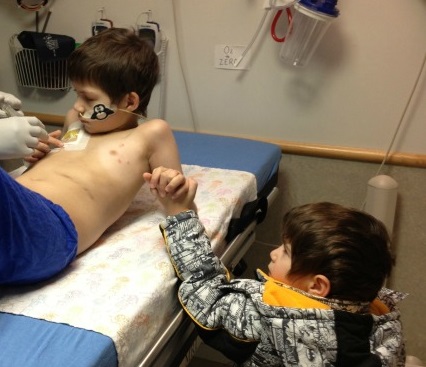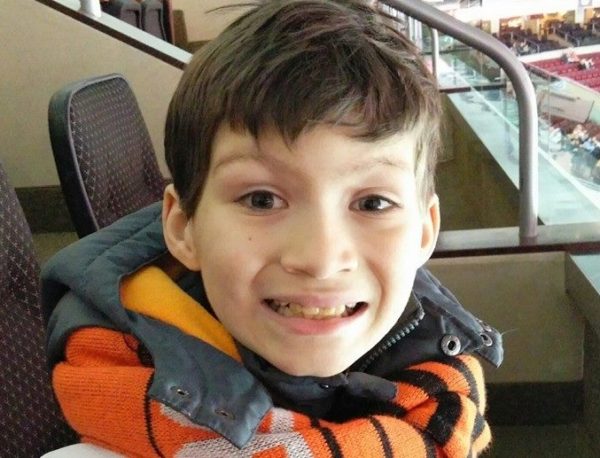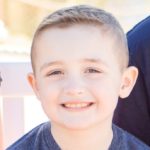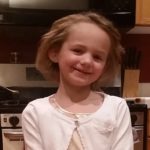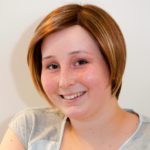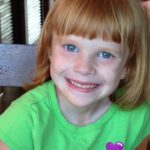“I think I’ll just be happy today.” – Julian
“You’re gonna hear tumor, you’re gonna hear cancer and you’re gonna hear little hope, but ignore all the statistics.”
The doctor’s words resonated in Kristi’s head, pushing her family forward even as her son Julian’s neuroblastoma worsened. The initial diagnosis took significant time to discover, their first doctor brushed off Julian’s frequent fevers and infections as “growing pains.” When the family finally found a pediatrician who would order x-rays and a blood test, they were told to rush Julian to the emergency room.
Once there, the discovery of his brain tumor spurred the doctor’s words of wisdom that guided Kristi, her husband Steven and their kids, Alex, now 22, and Brayden, 10, through Julian’s journey.
“The doctor kept telling me the only statistic I need to worry about is one and that’s Julian,” said Kristi. “We kept that thought constantly on the forefront.”
Julian was 6 years old upon diagnosis in August 2011. By December, they had moved all of his treatment from their local children’s hospital in Syracuse to Children’s Hospital of Philadelphia (CHOP). Their primary oncologist was Dr. Yael Mossé, an ALSF-funded researcher.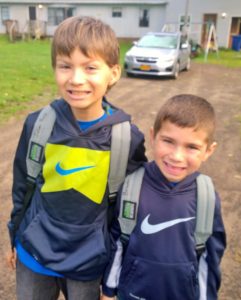
The first few months were difficult. First, Julian proved resistant to chemotherapy. They saw some positive results with MIBG therapy, a stem cell transplant and proton therapy that stemmed the tumor. However, nearly a year to the day after his initial diagnosis, the cancer relapsed and Julian was listed as terminal.
It was a blow to Julian’s family but a clinical trial for the drug Accutane, designed to stop his cancerous cells from growing, emerged as a treatment option. The possible side effects were risky.
“From the high fevers to trouble breathing to capillary leakage, there were a whole bunch of things that could go wrong,” said Kristi. “Dr. Mossé told us, ‘It’s not going to hurt anything to try once and see how he responds.’”
Julian was the last of 100 children enrolled in the trial. The trial’s results were unimpressive to that point, but with a terminal diagnosis, the best Julian’s family could hope for was more time.
“He had cancer in 98% of his body, in his bone marrow. His x-ray was encased in white, the scan was absolutely scary to look at,” said Kristi.
Instead, a miracle dropped at their doorstep.
“The doctors walked into the room and said, ‘I don’t understand your son. He’s all clear,’” said Kristi. “I wondered, ‘What do you mean he’s clear? All 99 children before him were not clear at all. It did nothing and yet here he is clear, the only one.”
Somehow, Julian had emerged from this trial with no evidence of disease. CHOP was so surprised by the result, they asked to retrieve additional tissues from Julian whenever possible to study.
“Of course we’re not going to say no if it can help further the research. Julian had so many friends similar to him, it’s all about the fight for a cure,” said Kristi.
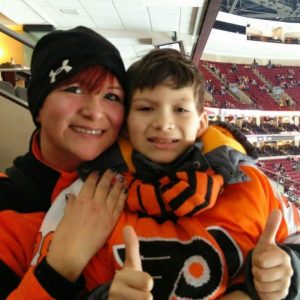 There were six blissful, treatment-free months that followed Julian’s unexpected recovery. Then, another relapse occurred in September 2013. In the years ahead, Julian faced new trial after new trial. But by early 2015, they faced the situation every childhood cancer family fears.
There were six blissful, treatment-free months that followed Julian’s unexpected recovery. Then, another relapse occurred in September 2013. In the years ahead, Julian faced new trial after new trial. But by early 2015, they faced the situation every childhood cancer family fears.
“Dr. Mossé tells us we’re really terminal now and the worst part is there’s nothing. No trials, nothing,” said Kristi. “That’s probably the worst feeling, not even a whisper.”
When their last hope at a novel T cell neuroblastoma trial in Maryland fell through, Julian went on hospice. His caring attitude continued to the end, donating toys and gifts to other kids in the hospital whenever possible.
Although Julian passed away at 10 years old in August 2015, his memorable fight inspired his family to continue battling childhood cancer. During treatment, they received support from ALSF’s Travel for Care program with hotel rooms and gas cards. In turn, they’ve hosted lemonade stands and became Foundation ambassadors. Their hope is to change the narrative for future families.
“Getting the money into research is huge because I think our story could’ve been different if there were more clinical trials available,” said Kristi.
For Julian, those clinical trials granted his family 1,465 days with him that a terminal diagnosis typically wouldn’t allow. He was here that much longer thanks to an overwhelmingly unsuccessful trial he barely got into and somehow thrived on. One out of 100.
In the end, one really was the only statistic that mattered.
Donate in honor of Julian to support childhood cancer research!
Your donation helps Alex’s Lemonade Stand Foundation fund critical pediatric cancer research projects across the country.